| Pages:
1
2
3
4
5 |
TheMrbunGee
Hazard to Others
  
Posts: 364
Registered: 13-7-2016
Location: EU
Member Is Offline
Mood: Phosphorising
|
|
Quote: Originally posted by Sulaiman  | IMO that is a suspension, not a solution which would be clear,
filter the suspension and crystalise the filtrate
How embarrassing that the combined brains of SM can't help identify an inorganic compound  |
Yes, there was some insoluble particles, that went through filter. I did filter it. 
Solution is now @ room temperature and some crystals have formed. Pictures below! 
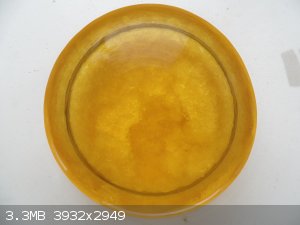 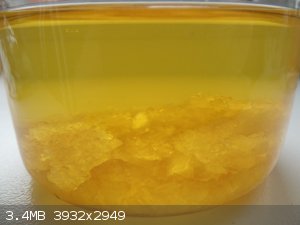
Macros of crystals for crystal fanats!
[Edited on 21-7-2016 by TheMrbunGee]
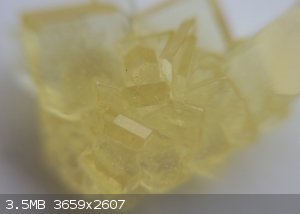 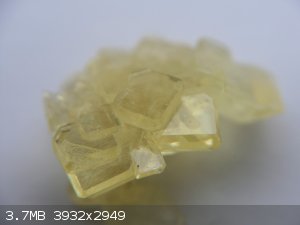
|
|
|
Sulaiman
International Hazard
    
Posts: 3723
Registered: 8-2-2015
Location: 3rd rock from the sun
Member Is Offline
|
|
my first guess https://en.wikipedia.org/wiki/Sodium_thiosulfate
the yellow suspension is sulphur.
I've not got enough knowledge to know if this is compatible with the earlier experimental results.
Edited : no gas with H2SO4 is confusing,
plus the colours are more for chromium salts of which I have no experience
.. any more would be guesswork based on more reading..
I thought I recognised the crystal shape ... wrong ... not sodium thiosulfate.
[Edited on 21-7-2016 by Sulaiman]
[Edited on 21-7-2016 by Sulaiman]
|
|
|
Neme
Hazard to Self
 
Posts: 86
Registered: 28-5-2016
Location: Czech republic
Member Is Offline
Mood: No Mood
|
|
These crystals look like potassium ferrocyanide, but you said there were not gases produced in reaction with sulfuric acid, right? Also the other
tests are not making this guess likely.
|
|
|
gdflp
Super Moderator
      
Posts: 1320
Registered: 14-2-2014
Location: NY, USA
Member Is Offline
Mood: Staring at code
|
|
That is almost certainly potassium ferrocyanide, at the very least it is part of a mixture. The solubility behavior is exactly what you would expect,
and in the reaction with nitric acid, the excess acid will oxidize the all of the iron to the +3 oxidation state creating that brown solution. Those
crystals are quite distinctive as well. For final confirmation, I would try reacting it a ferric salt of some kind to see how it reacts, a dark blue
solution should be the result. I have a feeling that your HCl might have some iron contamination, hence the blue color when the two are mixed. You
don't have to worry about HCN too much when mixing the ferrocyanide with acids so long as the mixture isn't heated, but take care in any event.
[Edited on 7-21-2016 by gdflp]
|
|
|
TheMrbunGee
Hazard to Others
  
Posts: 364
Registered: 13-7-2016
Location: EU
Member Is Offline
Mood: Phosphorising
|
|
Quote: Originally posted by Neme  | These crystals look like potassium ferrocyanide, but you said there were not gases produced in reaction with sulfuric acid, right? Also the other
tests are not making this guess likely.
|
Might be because I added acid to weak solution of it!
BUT YOU ARE RIGHT! Reaction with FeCl2 solution confirmed, that it is Potassium ferrocyanide! THank you!
OK, I will now prepare next mythical substance!
|
|
|
Neme
Hazard to Self
 
Posts: 86
Registered: 28-5-2016
Location: Czech republic
Member Is Offline
Mood: No Mood
|
|
Nice!
Please post another one soon, it's really funny for me 
|
|
|
Sulaiman
International Hazard
    
Posts: 3723
Registered: 8-2-2015
Location: 3rd rock from the sun
Member Is Offline
|
|
yes, another one, i need more embarassment 
|
|
|
The Volatile Chemist
International Hazard
    
Posts: 1981
Registered: 22-3-2014
Location: 'Stil' in the lab...
Member Is Offline
Mood: Copious
|
|
This is nice, better than the thread where someone just picked a compound out of the blue. And it's like a whodunit. I guessed it was
K4Fe(CN)6 before that was figured out. Also, the granule size in the original picture is a giveaway once some of the chemical
properties were shown. Potassium ferrocyanide is almost always sold in that form.
|
|
|
TheMrbunGee
Hazard to Others
  
Posts: 364
Registered: 13-7-2016
Location: EU
Member Is Offline
Mood: Phosphorising
|
|
What is this Chemical? [2]
Welcome to the part 2 of the game - What is this Chemical?
This time we have dark powder with a greenish accent, it is quite heavy, and kind of inert, only thing I got it to react with is aluminum powder, why
I am guessing it is a metal oxide. Reaction was fast and I could not collect any metal particles.
Doesn't react with:
HCl;
H2SO4;
HNO3;
NaOH;
Could not melt it with jet lighter.
Can't be oxidized with KNO3.
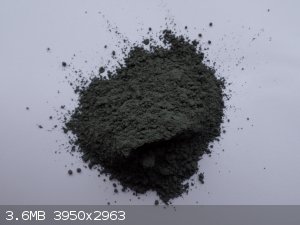
[Edited on 23-7-2016 by TheMrbunGee]
|
|
|
Amos
International Hazard
    
Posts: 1406
Registered: 25-3-2014
Location: Yes
Member Is Offline
Mood: No
|
|
Which acids and alkalis was it reacted with?
|
|
|
Texium
Administrator
       
Posts: 4618
Registered: 11-1-2014
Location: Salt Lake City
Member Is Offline
Mood: PhD candidate!
|
|
I would try fusing it with molten potassium hydroxide and potassium nitrate and then dissolving the melt (once it cools) in a sodium hydroxide
solution (20% or so). I think it may be low quality manganese dioxide. If it is this should yield a dark blue-green solution of manganate(VI). It
could also be a low quality copper(II) oxide that has been calcined to the point of being unreactive. If it is then that same treatment should yield a
dark blue cuprate solution.
|
|
|
kavu
Hazard to Others
  
Posts: 207
Registered: 11-9-2011
Location: Scandinavia
Member Is Offline
Mood: To understand is to synthesize
|
|
Looks a lot like chromium(III)oxide and the reactivity profile would match as well. You could check if it catalyses the oxidation of ammonia (a
classic demo experiment http://www.rsc.org/learn-chemistry/resource/res00000988/chro...)
|
|
|
TheMrbunGee
Hazard to Others
  
Posts: 364
Registered: 13-7-2016
Location: EU
Member Is Offline
Mood: Phosphorising
|
|
So the catalytic the oxidation of ammonia did not work. chromium (III) oxide is also kind of green, more green than this powder.
Fusing it with molten potassium hydroxide and potassium nitrate also did not change anything. :/
It is remarkably heavy, may be it is lead compound? It is really almost as heavy as lead powder.
EDIT: I was able to collect a bunch of metal particles after few thermite reactions. this will make the task much more easy, because the particles are
magnetic! 
Pictures of particles below!
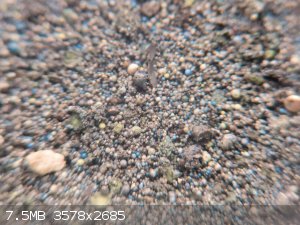
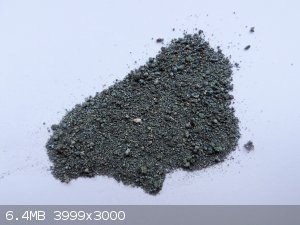
So - nickel or cobalt oxide?
[Edited on 23-7-2016 by TheMrbunGee]
|
|
|
DraconicAcid
International Hazard
    
Posts: 4356
Registered: 1-2-2013
Location: The tiniest college campus ever....
Member Is Offline
Mood: Semi-victorious.
|
|
Collect the metal particles and dissolve them in hydrochloric acid. The colour of the solution (or the residue, if allowed to go to dryness) will
tell us a lot.
Please remember: "Filtrate" is not a verb.
Write up your lab reports the way your instructor wants them, not the way your ex-instructor wants them.
|
|
|
TheMrbunGee
Hazard to Others
  
Posts: 364
Registered: 13-7-2016
Location: EU
Member Is Offline
Mood: Phosphorising
|
|
Quote: Originally posted by DraconicAcid  | | Collect the metal particles and dissolve them in hydrochloric acid. The colour of the solution (or the residue, if allowed to go to dryness) will
tell us a lot. |
Extracted the metal and added nitric acid to it, green solution tells that it is nickel, and the chemical I began with is nickel (III) oxide!
This was kind of easy one! 
|
|
|
Texium
|
Threads Merged
23-7-2016 at 10:01 |
Neme
Hazard to Self
 
Posts: 86
Registered: 28-5-2016
Location: Czech republic
Member Is Offline
Mood: No Mood
|
|
Shame I got home too late to have a chance, another one please! 
|
|
|
TheMrbunGee
Hazard to Others
  
Posts: 364
Registered: 13-7-2016
Location: EU
Member Is Offline
Mood: Phosphorising
|
|
Next one will be out tomorrow! 
|
|
|
Herr Haber
International Hazard
    
Posts: 1236
Registered: 29-1-2016
Member Is Offline
Mood: No Mood
|
|
Pokemon Go? PAH !
Now that's a treasure hunt I like 
|
|
|
TheMrbunGee
Hazard to Others
  
Posts: 364
Registered: 13-7-2016
Location: EU
Member Is Offline
Mood: Phosphorising
|
|
A wild Chemical appears!
So this one is colorless flaky crystals. Inorganic. Label was mostly ripped off, but I saw Na, so it is sodium salt.
Solubility is around 80g/100 ml (95C) water.
It kind off acts as a flux, because i was melting it on piece of Al foil and it spread on the foil when melted, but I have Na2B4O7 and it looks
different and acts different when melted.
Right now I am cooling the saturated solution, to get pure crystals, and it looks like nothing has precipitated at around 30C .
The crystals have a tiny bit of faint yellow color, but I am not sure if that is just an impurity or what.
I have some things to do now, but When I’ll be back I will do more tests.
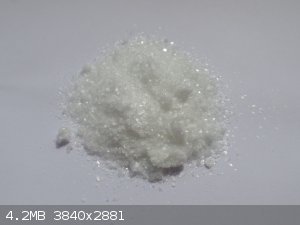
The next day:
I had divided the solution I tried to crystalize and put one in the freezer (-15) and other left outside (about +18 at night)
The one in the freezer precipitated super tiny crystals that sat in suspension and the outside one precipitated larger flaky crystals, just like the
solid ones in the first picture..
So I did a few tests :
Nothing visible happened with :
1)HCl(conc.)
2)H2SO4 (I dropped small amount of crystals in conc. acid and they turned a tiny bit more yellow, but that’s all. )
3)HNO3 (conc.)
4)KOH (solution)
5)NaOH (solution)
6)NH4OH (solution)
7)Na2Cr4O7 (solution)
I forgot to mention that it is crystal hydrate.
And finally i poured CuSO4 solution into mystery crystal solution and got reaction!
Video
[Edited on 26-7-2016 by TheMrbunGee]
|
|
|
Neme
Hazard to Self
 
Posts: 86
Registered: 28-5-2016
Location: Czech republic
Member Is Offline
Mood: No Mood
|
|
Well I think we need a clue. Could you please try reaction with Ca2+?
|
|
|
Praxichys
International Hazard
    
Posts: 1063
Registered: 31-7-2013
Location: Detroit, Michigan, USA
Member Is Offline
Mood: Coprecipitated
|
|
That looks a lot like sodium thiosulfate pentahydrate.
The reaction with copper sulfate should have been more yellow if that was the case, but it fits all the other (non)reactions. Hmmm.
|
|
|
Neme
Hazard to Self
 
Posts: 86
Registered: 28-5-2016
Location: Czech republic
Member Is Offline
Mood: No Mood
|
|
Quote: Originally posted by Praxichys  | That looks a lot like sodium thiosulfate pentahydrate.
The reaction with copper sulfate should have been more yellow if that was the case, but it fits all the other (non)reactions. Hmmm.
|
I don't agree, there should be reaction with hydrochloric acid producing elemental sulfur. Your theory would agree with the sulfuric acid test tho
(yellow from sulfur).
|
|
|
mayko
International Hazard
    
Posts: 1218
Registered: 17-1-2013
Location: Carrboro, NC
Member Is Offline
Mood: anomalous (Euclid class)
|
|
Have you tried adding a bit to some tincture of iodine? That would pretty quickly confirm/disconfirm thiosulfate.
al-khemie is not a terrorist organization
"Chemicals, chemicals... I need chemicals!" - George Hayduke
"Wubbalubba dub-dub!" - Rick Sanchez
|
|
|
TheMrbunGee
Hazard to Others
  
Posts: 364
Registered: 13-7-2016
Location: EU
Member Is Offline
Mood: Phosphorising
|
|
Quote: Originally posted by mayko  | | Have you tried adding a bit to some tincture of iodine? That would pretty quickly confirm/disconfirm thiosulfate. |
Test was negative. it is not Na2S2O3
|
|
|
RocksInHead
Harmless

Posts: 39
Registered: 16-6-2016
Member Is Offline
Mood: Highly Nitrated
|
|
This is kind of a long shot (considering it is crystaline) but it might be sodium carbonate maybe? Seeing how you added the CuSO4 and got a green
insoluble salt it may have been Na2CO3, considering that Cu3(OH)2(CO3)2 is greenish blue.
|
|
|
| Pages:
1
2
3
4
5 |